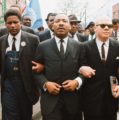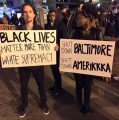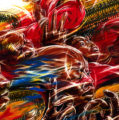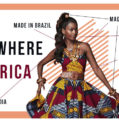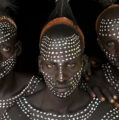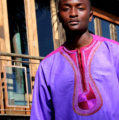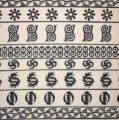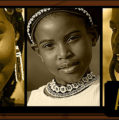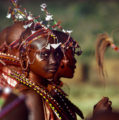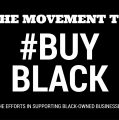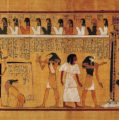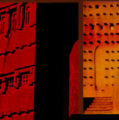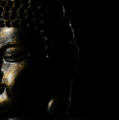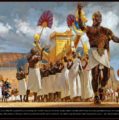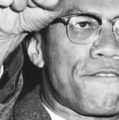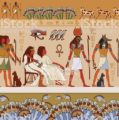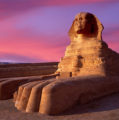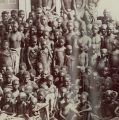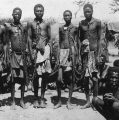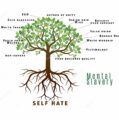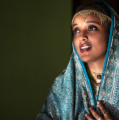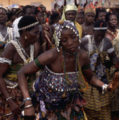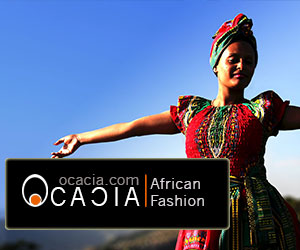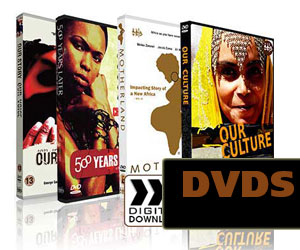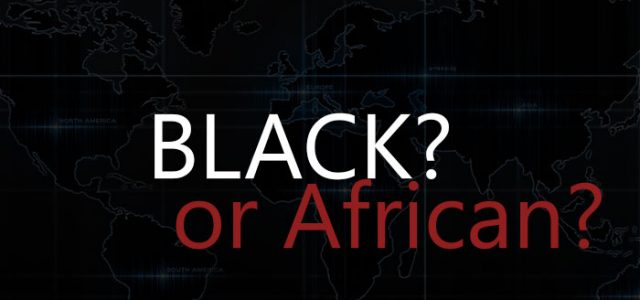
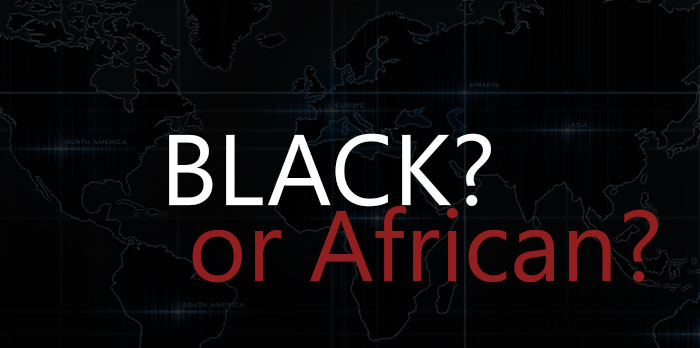
Black or African | We are more than a color
IdentityLanguage December 12, 2016 Alik Shahadah

Blackness Started in Slavery
Please also see the article on African Race which has overlapping and extended info
We have to start this discussion in its most basic terms. Where do Black people originate from? Then if the answer is Africa, then what is the purpose of identifying with a color over our beautiful Motherland? We could end all discussions with just that simple sentence. When Europeans were trying to sell their color identities to Indians, Chinese and Native Americans we are the only ones who bought this color-based identity and invested everything in it. The Indians never once traded being Indian/Asian for brown. The Chinese did not trade being Asian for yellow–not even for 1 second. They do not have yellow history month and Yellow Lives Matter.
Black is a construction, which articulates a recent social-political reality of people of color (pigmented people). Black is not a racial family, an ethnic group or a super-ethnic group. Political blackness is thus not an identity but moreover a social-political consequence of a world that after colonialism and slavery existed in those color terms.
“white” depends for its stability on its negation, “black.” Neither exists without the other, and both come into being at the moment of imperial conquest– Fanon
In our modern era old identities split apart and reform along more self-determined line to recover what was lost after the impact of conquest and domination. We see The Gypsies are now to be called “Roma,” and the reindeer-herding Lapps of Northern Scandinavia are the “Saami.” Similarly, some now claim the Iroquois Indians should be called the “Haudenosaunee” and the Cherokee the “Tsalagi” [3]
Africans have gone from Negro (Spanish for Black) to Black (English for Negro) what has changed? Only the language. [6] Identity is generally geographical and ties the people to their native environment or their core doctrine (Jews of Judaism, Muslims of Islam, Chinese of China).
Very few Africans are actually Black in color, so where is the foundation of Black people or black people coming from? It is how Africans were seen relative to the European people. So relative to the pales skin of Europeans and White Arabs the most dominant thing about Africans was relative skin color. Hence the exonym Black in the eyes of the “other.” It was not the land, not the African hair, but the relative color of a diverse skin pigment – that is rarely black in color. For Indians it is their land, for Chinese, it is their land, for Jews, it is their faith and a notion of Israel. Yet Condolezza Rice feels the best thing that describes her in America is blackness. And to some extent, she is right, because there is nothing in her cultural, ethical, aesthetic, outlook that resembles the continent her ancestors came from. She has replaced Africa with America, and finally Africaness with dreams of the White ideal.

We are Africans not blacks
African and black are not interchangeable just as Dark continent and Africa are not. Self-determination allows people to re-examine definitions and sculpt them to their reality. Black, like Negro is facing linguistic extinction, especially in academic circles, due to its poor foundation in speaking about the oldest and most diverse people on the planet. Notice today only two races go by color labels; The race with the most oppression and the ones inflicting that oppression. “I am black and proud” is a song, nothing else. It is the rhetoric necessary at the time to lift an oppressed people who only knew of themselves through the eyes of their oppressors. It has run its course and has expired.
Some have argued that African people choose “black” as an acceptable identity. The evidence is in all the books African-Americans write where the word “black” (lowercase) is used without care. But self-determination has a condition – full knowledge of self. And this is why we see the new Nig*er identity which by the same mass consensus process seems to be a valid new identity. And just like “black” it is again almost exclusively the world view of a minority African population living in America.
n Mauritania, the Haratin account for as much as 40% of the Mauritania population. They are sometimes referred to as “Black Moors“, in contrast to Beidane. The Haratin are Arabic-speakers, and generally claim a Berber or Arab origin, which is contrasted against other African peoples in southern Mauritania (such as the Wolof and Fula people who have populations in Mauritania). The Haratine, consider themselves part of the Moorish community. But where it becomes problematic is because they are “darker” in color, they are assumed to be slaves brought from “black Africa.” So powerful is the theory of “two” Africa’s that reality is twisted to accommodate its validity. Every study is looking at Africa through the lens of “Black and White”, “slave and master.” It is therefore never considered that these “black” populations, like the Kanuri, who migrated South from North Africa, are native to the region. In a struggle to sustain colonial linguistics all forms of pseudo -anthropology is imposed on the African reality posing itself as mainstream studies. [5]
NO AGENCY
- We cannot say we are African (Since Whites in South African sometimes, when the mood is right, want to share that identity with us.
- Many groups on Earth call themselves blacks–so that is not unique.
- And then there is North Africa so we need to separate our identity in Africa from theirs
- Then we must remember in so-called Sub-Saharan African Berbers and Arabs are considered natives (like Mauritania) so we need to return to the name anthropologist still use to define us which is Negro.
So what is left black Sub-Saharan Negroid African. This is what happens when you are a race that has its identity imposed upon by everyone with agency.
NO HISTORICAL RECORD
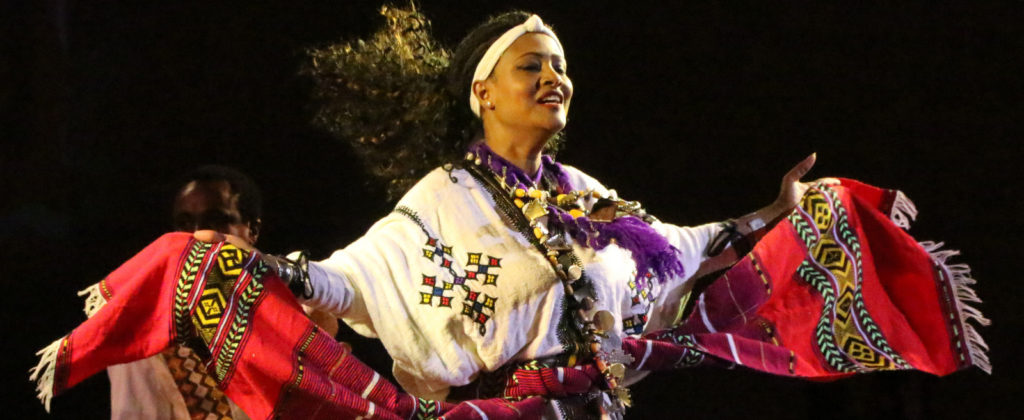
Ethiopia never had a history of “Black” identity
The word “Black” has no historical or cultural association, it was a name born when Africans were broken down in to transferable labor units and transported as chattel to the Americas. The re-labeling of the Mandinka, Fulani, Igbo, Asante, into one bland color label- black, was part of the greater process of absolute removal of African identity; a color epithet that Europe believed to be the lowest color on Earth, thus reflecting the social designation of African people in European psyche. When Africans, out of their own agency refer to themselves they do so with internal paradigms and self-affirmation. No where in Africa did Africans see the obvious, the natural skin color they had, as the most distinctive characteristic in defining them:
Zulu – People of the sky
Khoi Khoi – King of men
Numunuu (Native Americans) – The people
Mediterranean — ” Our Sea”
Senegal – “Our land”
Navajo -“Diné” meaning “The People”
Han-in (Korean: 한인; Hanja: 韓人; literally “great people”)
Bantu – “human” {note}
In this history of Swahili the people called themselves “people” no color attached. Attaching color is only done to refer to “the other.” In Zulu Kingdom again we see no record of a self-reference to a “Black people” they called themselves “People of the Sky” until White people showed up and called them blacks. It is true the term Ethiopia in ancient times meant “burnt face” but the modern name Ethiopia is a name not a Greek word. And the critical thing is name verses descriptive terms. The same is true for Sudan.
ODD ETHNIC GROUP
Sesame Street use to play a game called Which one is the odd one out. Can you spot which of all of these so-called Ethnic names is the odd one out:
East Asian (a place)
Southeast Asian (a place)
South Asian (a place)
Black (a color)
Hispanic/Latino (a language group tied to a place)
Caucasian (a place)
Middle Eastern (a place)
Native American/First Nations (a place)
Pacific Islander (a place)
Arab (a place)
Linguistic evolution? COLORED – NEGRO – BLACK – AFRICAN-AMERICAN – NIG*ER
BLACK HISTORY
Black history is the history of enslavement; African history is the history of humanity. If there are no White people, could there be Black people? For over 100,000 years there were only native people of Africa on the planet, and since there were no “White” people there could not have been Black people, since everyone would have been “Black.” This is even more profound when you realize African people are the only truly native people of the place they inhabit—everyone else is at some point a settler.
Every ethnic group in this country has a reference to some land base, some historical cultural base. African-Americans have hit that level of cultural maturity… To be called African-American has cultural integrity– Jesse Jackson
And if all the “White people” vanished from the Earth, would the remaining “Black” people still be Black? So the older group must define itself relative to the European newcomers? Would it not make far more logical, historically, linguistically, and social to describe people by their land of origin. Negro = Negroid = Colored = Nigger = Black (all associated with color none are connected to a continent). Now compare this to Asiatic, Caucasoid, and Mongoloid (all are tied to land, all can be located on a map— but not so Negroid/Black). Black and White are therefore debunked as regressive incomplete terms for describing people.
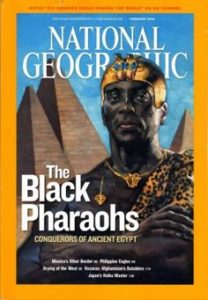
Black Pharaohs of Egypt?
For all of recorded history we see in every conflict a central theme — that of “land.” So critical as humans need land to grow crops on, to source water from (see Golan Heights), they need a place to build cities and a place to harvest mineral wealth from. So attaching your identity to land makes sense: Attaching your identity to an abstract color, does not. Black and African are not interchangeable in any logical sense. African people claim an African origin and Africa as their Motherland. There is nothing in “blackness” that logically implies any claim to anything of value, except into bondage. All it tells the world is relative to the dominant race class these group of people are “black.” And in Africa it is even worse, because language wise no majority defines themselves against a minority. i.e. Sudan (Northern Sudan) is still Sudan, but Southern Sudan has to insert “South” for clarity. Holocaust, on its own, is assigned to the Jews, who do not insert “Jews” before Holocaust, since they are the first to use the term in its modern context. How can the majority in South Africa need to identify themselves as “black” relative to a “white” when they are an overwhelming majority and hence “the norm”?
And what is even more revealing is that Dutch settlers in South Africa branded themselves as Afrikaners laying claim to the land they conquered. Signifying in that naming process they were the native European tribe of of Africa (per Zuma). And yet Natives in South Africa still refer to themselves, with glee, as blacks.
It is amazing in our modern era that an entire nation of people, who are free to think and free to reflect– the oldest nation on the planet, the parents to every other people are confined by a name that reflects only their supposed skin color — and nothing else. Being “black people” is still today indelible fixed in Western lexicon (both African American and White), despite all the evidence contradictory such color-based terminologies and the profound work of Malcolm X and especially Richard B. Moore to favor African over Black, which would give a humanist representation of marginalized people. And the perplexing thing is general contentment and seeming inability to see the obvious menace in the term. Only two groups remain on Earth adhering to color labels; the most exploited people in the history of humanity (Black people), and their apex oppressors (White people).
True freedom is not only the right to vote, but the right to self-define and the right to interrogate definitions imposed and formulate new ones, which favor the African in any given political climate
If linguistically we reject the term Sub-Saharan Africathen therefore there is no Sub-Saharan history or people; as distinct from North Africa. We then only have African people and a history of Africa.
We must realize these are still colonial classifications like Middle East which have nothing to do with historical Africa. We cannot discuss a history of Africa in these colonial boxes which only served to humiliate and take away from the continent. The terms create paradigms that limit, rather than expand, reality. If there are a black or Black people then where do “black” people come form? Since Asians come from Asia, Indians from India (all makes perfect logical sense).
So where do Black people come from? Blackia, Negroland or Blackistan, following the obvious naming convention. What is the capital city of the Black home world? Black City or Blackatropolis? So if Africans do not come from these fictitious places and we find that so-called Black people come from Africa (at some time in our recent history) then why not just call them Africans? At best the term is redundant. So what is the purpose of Blackness? Especially in a world where identity and land are exclusively interlinked for every other people: Jews of Israeli, Palestinians of Palestine, Indians of India, Zulu of Zululand, Masai of the Masai Mara
Twenty-two million African-Americans – that’s what we are – Africans who are in America– Malcolm X
Blackness, is largely a Western or American exonym, in which all so-called Black cultures around the world are forced to fit into. As Americanism expanded so to did this notion of blackness, which is attached to the civil rights struggle and today to the urban cultures of the inner cities. However, It cannot be transplanted into ancient history to describe a people such as Ancient Ethiopia who had no cultural similarities to the modern African-Americans communities. Neither can “Blackness” be put in history to say the Ancient Egyptians were not Black because they did not share characteristics with a group of Africans Europeans chose to label as the archetypal Black population (black skin, thick lips and kinky hair). To do so creates connections and disconnections where there are none. So “Black culture” or “Blackness” cannot be imposed anywhere beyond the modern era. But we can say Cultures of Africa, in which Egypt and Ethiopia were part of that African world. Being African doesn’t mean we all dance to the same music and worship the same tree. So outside of the suggestiveness of “black” and “negro” words are necessary in creating new paradigms or we will always get stuck hearing “Well the Egyptians were not Black” because of a language issue or some other technicality. Far less objections could be raised if we just stuck to “The Egyptians were Africans“. Especially if we claim African as oppose to let it float.
The political question of the contributions of modern day African people must be addressed and in this respect Ancient Egypt, Ancient Ethiopia were African civilizations, the same way Greece was an Ancient European civilization (it was located in modern Europe). But this argument is a political because we live in a racialized world that discredits a people’s worth by notions of racial origin and assumes black skin is too inferior to construct civilization.
KEMET =/= BLACK PEOPLE
The ideogram indicates the context in which the word applies. An ideogram for humans would always be used to represent a word that applied to people. However, Kemet can only mean Black Land since the ideogram indicates it is describing a built or non-human environment. They called themselves “remetch en Kemet”, which means the “People of the Black Land.” Where rmt means simple without any adjectives “the people,” the same way the Numunuu means “the people.”(the authentic people) And likewise Zulu means people of heaven.
Ancient Egypt is commonly referred to as ‘km.t’ , with the theorized reference to the black Nile Delta earth. The determinative O49 is used to designate the term for ‘country, inhabited/cultivated land’, called the niw.t (a political designate). It is a circle with a cross which represents a street, ‘town intersection”(Gardiner 2005 (1957): 498)
But none of this discredits the founders of Kemet as being African people, just like the Fulani or the Amhara. “Black” in the North American context. The “social “construction of race in America does not rely on skin color. “African Americans,” as even Asante notes, ” constitute the most heterogeneous group in the United States biologically, but perhaps one of the most homogeneous socially.”
BLACK AND THE 60’s
Black pride is reactionary pride, necessary then, Irrelevant now. As we blossom into a greater historical and cultural awareness of a Motherland a detachment with fictional attachments to slave names must be challenged, and we must end the romance with things that are a disservice to our identity today.
It is worth noting parts of African that are culturally intact such as in Ethiopia, Mali, Somalia, Nigeria and Niger have absolutely no fondness or linguistic presence of a “black identity.”
New York Times | The term African-American has crept steadily into the nation’s vocabulary since 1988, when the Rev. Jesse Jackson held a news conference to urge Americans to use it to refer to blacks. ”It puts us in our proper historical context,” Mr. Jackson said then, adding in a recent interview that he still favored the term. ”Every ethnic group in this country has a reference to some land base, some historical cultural base. African-Americans have hit that level of cultural maturity.” Since 1989, the number of blacks using the term has steadily increased, polls show. In a survey that year conducted by ABC and The Washington Post, 66 percent said they preferred the term black, 22 preferred African-American, 10 percent liked both terms and 2 percent had no opinion. In 2000, the Census Bureau for the first time allowed respondents to check a box that carried the heading African-American next to the term black. In 2003, a poll by the same news organizations found that 48 percent of blacks preferred the term African-American, 35 percent favored black and 17 percent liked both terms. (ref)
BLACK-AFRICA IS A RACIST TERM
Nobody on this planet puts an adjective on their identity, especially when they are a majority, except African people. Black Africa, Dark Continent, and Heart of Darkness all articulate the colonial contempt for a continent and its people. But how does one arrive at the term “black Africans,” are there green Africans? Would you speak of “yellow Chinese,” or “brown Indians”? Even terms like “White Russian” are unused, despite Russia being a multi-ethnic nation. Because 80% white means the majority have no need for adding White to their Russian to qualify against a minority of “other” Russians. [3] Globally the term ” Red Indian” is rejected as deeply pejorative yet “black African” is still used even in South Africa which is used to define the majority of the population against the minority so-called white Africans. Black African is as ridiculous as “rock stone”, rocks are stones so why double up two realities that are often the same?
There is an infinite and inexhaustible list of examples that show that no one with power wears an adjective on their identity, especially when equal or a majority. The peninsula of Korea is called Chosŏn Pando (조선반도; 朝鮮半島) in North Korea and Han Bando (한반도; 韓半島) in South Korea based on the respective names of the two countries. (Wikipedia)They both use “Korea” as part of their official English names. In other words, North Korea does not say they are North Korean, as far as they are concerned they are the KOREA. The South does not waste time defining itself as South Korea, again, as far as their national pride is concerned they are just Korea. Both countries have equal political and cultural agencies. So how is it possible for a continent whose overwhelming demographic, political, and cultural majority is African, need to refer to themselves as black + African? And with the split of N. Sudan and S. Sudan it would be shocking to see if N. Sudan adds the term “North” to its national rhetoric, to clarify itself from its new southern neighbor.
There is only one reason the term Black African exists and that is to deny nobility from African people. To explain away how Egypt could be nested in Africa but at the same time divorced from the majority of the African people. Therefore the argument “yes it is in Africa, but it is not Black African.” It is almost like saying Greece was a European civilization, but not a White European civilization.
If 95% of Africans are “Black” (capital B, if it must be used) then the minority should bear the adjective–not the majority. It is disrespectful to describe Africans with a label based solely on a color, especially when it does not accurately reflect the physical appearance of most Africans. This is made even more offensive when the etymological root of that label (black) is derived from the word Negro, and is used in place of the word African as a racial or cultural identity. In reality we must ask ourselves what is the difference between “Negro” and “Black” save historical association, the words mean the same thing, so we have moved from being Black in Spanish (negro) to Black in English (black). It is strange that despite all the genetic research and advanced human anthropology we are still clinging to primitive 18th-century post-Darwin model of race, which sole aim was/is to segregate and de-culturalize and enslave.
The concept of a “black Africa ” is a Eurocentric term based upon their ignorant primitive regressive deductions. It is true Arabs and Greeks referred to Africans as “black” but this was not a racial label, and moreover Africans themselves did not self-apply these external labels. Like the Phoenician who were called the “red people,” but no Phoenician would have referred to themselves in this way.
CHILDREN DIS-IDENTIFY WITH BLACK
In a recent survey conducted by the African Holocaust society it was noted that young African children (approx 4-5 years old, the age of race consciousness) when told they were members of the “black race” reacted with great confusion because they were also being taught the names of colors. Most of them objected to being called black and said they were not black but rather brown. A repeated survey found that when they were told they were African they did not object to the logic (they were African because their ancestors were from the continent called Africa). Blackness is illogical and only exist by force conditioning of children. This case study is profound because it shows how logic and identify form before social concepts are enforced.

Europeans in Africa
It would be very strange if a European, after 200 years in China or India, could be so powerful to alter the definition of Chinese just to be accommodated. Linguistic accommodation is only possible in Africa because of the prevailing injustice of a post-colonial dominance of European settlers. It is clear some European funded African politicians backed it, but where did it originate from? It is interesting to note Europeans (including white Arabs) constitute around 10 million people verses the 800 million plus Africans. Now this negligible minority by way of social influence has caused the majority to need to refer to themselves with the adjective of “black” to separate themselves from a serious minority group who want to be “white Africans.”
Minorities of Europeans live in China, in India and in Arabia yet only in Africa has linguistic accommodation been given. Africans now must make room for those settlers who want to identify with the continent for capitalist reasons. Because once you identify with a continent then you have a legitimate claim to its resources. Thus the saying and the philosophy of Garvey “Africa for the Africans” becomes usurped. In South Africa the new trend of “Black Economic Empowerment” has seen the broadening, opening up of the borders of blackness so to speak. Indians are economically classified as ‘black’, and recently Chinese have been included in this definition. So again we see the relationship between linguistics and economic profit.In the scramble for linguistic real estate, why would these descendants of European colonialist who devastated and exploited the continent want to be called African? And in terms of self-determination who introduced these concepts?
Despite claiming “African” in name they are very conscious of Whiteness when propagating the White dominant image on the broadcast mediums they control. Being White is clearly obvious when it comes to the dilemma of ownership which is still tipped in their favor. When all of these White South Africans rush home to Europe (when Africa gets a little sticky) do they encounter job discrimination experienced by fellow African South Africans or even 3rd and 4th generation African-British? They integrate seamlessly into the social environment created by White privilege. Seems like with the Indian “Africans”, African is a jacket worn to suit an economic or political opportunity.
Race was not only defined in the 18th century, in Aksum and Kemet African peoples have always identified with degrees of racial inclusion and exclusion. The arrogance of Whiteness is to assume they are responsible for every single point of view that has ever existed on this planet. All the while South Africa remains White dominant and unchallenged by people who are the most vocal White Africans. Interestingly if you examine their lifestyle, you will find them to be the most racial conservative personalities. They date and marry women of their specific race, they socialize in White circles, they engage a distinctive non-African culture. And if they do have a few token “Black” friends they are often culturally compromised aberrations the continent can produce. The injustices of White dominance and the legacy of that dominance are smooth over by fictional fantasies of non-returning colonial tourist who still impose their reality as the norm for everyone else. Moreover, in dealing with these issues they always select broad base arguments and never deal with the core issue of African self-determination and agency.
PREVIOUSLY DISADVANAGE (SA)
In South Africa Africans have prior to apartheid were called simply African, Then in Apartheid they became Blacks and now in the racially sterilized post-apartheid environment they have moved from Blacks to an ethnic group called “previously disadvantage.” Since the word African is being grabbed up by whites and black [sic] has been taken by Indians and now Chinese. The inescapable question that needs to be posed to the genius that went into constructing this awkward term is, what is “previous” about the disadvantage of the African majority in South Africa? According to every social-economic indicator the disadvantage is still a reality. It is linguistic warfare to remove people’s ability to even reference themselves to describe their unique social reality. And if there is a “previously disadvantaged group” why then do you need social programs such as BEE to treat this problem? It makes no logical sense to treat a people as disadvantaged who are now previously disadvantaged.
AFRICAN IS A NOT A FOREIGN NAME
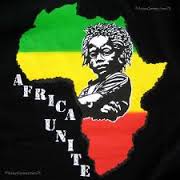
Africa Unite
Africa, unlike “black,” is a name, not an adjective. You can get on a plane and visit it, you can find it on a Sat Nav, it has boundaries and governments, and you can grow crops on it, and build a house on it. But some say, Africa was a foreign name given to us, if this is true, it was given to us by our contemporaries, not our conquerors. However, the word may have Berber Tunisian origins meaning ” A sunny place” – Ifriqiya. Romans appropriated this word from which it is believed the modern word Africa came about the describe the entire continent. According to the Encyclopedia of Islam the word actually is one appropriated into Arabic from Berber people.1)Ifrīqiya is the name given in the Arabic sources to a region in the Muslim West. Its origins are tied to the former Roman province of Africa, which covered the eastern part of North Africa and excluded the Mauretanias (except at the time of Diocletian, when the diocese of Africa covered the entire Maghrib). Arab writers, however, ascribed to it an etymology arising from an orientalised memory of the pre-Islamic history of the Maghrib and, therefore, of the Berbers. Valérian, Dominique, “Ifrīqiya”, in: Encyclopaedia of Islam
In addition, Africa is a unique name of a place and Africans are simply people who are native to that place. And over the course of history, different names such as Habesha and Takruri were used to refer to African people of various regions, Ethiopia and West Africa respectively. Also the word Moor has been used across the centuries but as critics have established, the term “Moor” was used interchangeably with such other ambiguous terms such as “Ethiopian,” “Negro,” and even “Indian” to designate a figure from different parts or the whole of Africa (or beyond) who was either black or Muslim, neither, or both. [3]
In the case of an “original” 100% native word for Africa, the problem is tied to identity, in this case the modern occurrence of a pan-African identity (lowercase ‘p’). Therefore you cannot take a Zulu word and apply it to a broad continent and say it was “original” Zulu people did not have the knowledge of the continent’s width and breadth to name it. So people of Ethiopia never saw people in say Namibia, they did not go and look them up. Enat Hager (Motherland) was defined exclusively within Ethiopian spheres of interest and knowledge. It was also exclusive of what they would have perceived as other. There was no great desire for them and other African nations to see a pan-African continent. All of these factors mean there was no original pan-African name for the entire continent that we know of.
Many fail to see that “black” ultimately sets Africans outside of their connection to history and culture. Black does not connect us to Kemet, it only goes back 500 Years ago. Hence, “black” people are an “urban” people/culture and “urban” people’s history is 5 minutes old. In addition, because it is a term placed on us, we have no bases for its control, and hence they are able to say; “Ancient Egyptians weren’t black.” Black has no meaning; except the meaning they place on it, if and when they chose.
Ethiopia means “Burnt face” (Greek), but it has long since moved over from a “color” to a Nation — Modern Ethiopia. Holocaust (Greek) means “burn down” that usage has long since expired, especially with the death of Classical Greek. All words have some origin, for example Moor, but today they have long crossed over from their original meaning to become names.
GREECE EXAMPLE
Per Wikipedia: The English name Greece and the similar adaptations in other languages derive from the Latin name Graecia (Greek: Γραικία), literally meaning ‘the land of the Greeks’, which was used by Ancient Romans to denote the area of modern-day Greece. Similarly, the Latin name of the nation was Graeci, which is the origin of the English name Greeks. Those names, in turn, trace their origin from Graecus, the Latin adaptation of the Greek name Γραικός (pl. Γραικοί), which means ‘Greek’, but its etymology remains uncertain. It is unclear why the Romans called the country Graecia and its people Graeci, but the Greeks called their land Hellas and themselves. William Smith notes in his Dictionary of Greek and Roman Geography that foreigners frequently refer to people by a different name (an exonym) from their native one (an endonym).
Aristotle was the first to use the name Graeci (Γραικοί), in his Meteorology. He wrote that the area around Dodona and the Achelous River was inhabited by the Selli and a people, who had been called Graeci but were called Hellenes by his time.
What all of this is saying is names are lost to time, what we know people by, and what they called themselves are different. Ancient Ghana and modern Ghana are not the same places. And if you do not know this you can imagine the mess you would make assuming.
References
| ↑1 | Ifrīqiya is the name given in the Arabic sources to a region in the Muslim West. Its origins are tied to the former Roman province of Africa, which covered the eastern part of North Africa and excluded the Mauretanias (except at the time of Diocletian, when the diocese of Africa covered the entire Maghrib). Arab writers, however, ascribed to it an etymology arising from an orientalised memory of the pre-Islamic history of the Maghrib and, therefore, of the Berbers. Valérian, Dominique, “Ifrīqiya”, in: Encyclopaedia of Islam |
|---|






